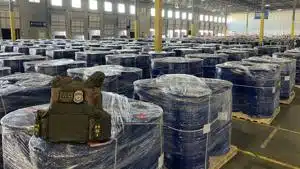(The Center Square) – Federal agents made history by seizing the largest volume of precursors used to produce methamphetamine after interdicting two shipments from two ships on the high seas.
U.S. Department of Homeland Security’s Homeland Security Investigations (HSI) agents working overseas seized more than 300,000 kilograms (nearly 700,000 pounds) from two ships that departed Shanghai, China. They were headed to Mexico to be used in clandestine labs run by the Sinaloa Cartel, federal authorities said.
“We intercepted them on the high seas and now the Sinaloa Cartel will not be able to use them to make methamphetamine,” U.S. Attorney for the District of Columbia Jeanine Ferris Pirro said.
Because the Trump administration designated the Sinaloa Cartel as a Foreign Terrorist Organization, the designation “gave us the ability to move quicker and seize quicker,” Piro said.
The precursors were seized as part of the administration’s efforts to target terrorist organizations.
“Every day, tons of chemicals that are used to create synthetic drugs like methamphetamine and fentanyl are shipped from China to Mexico in China’s undeclared war against America and her citizens,” Piro said. Those aiding and abetting the Chinese and Mexican cartels are providing material support to terrorism, she said.
The seizure is the largest volume of precursor chemicals used to manufacture methamphetamine ever seized in U.S. history, authorities said.
By comparison, in fiscal 2024, CPB agents seized 78,925 kilos (nearly 174,000 pounds) of methamphetamine at the southwest border alone, according to CBP data.
Piro’s office obtained the seizure warrant under the terrorism forfeiture provision of federal law after Secretary of State Marco Rubio designated the cartels and others as foreign terrorist organizations in February.
It was the first time a warrant was issued for HSI agents to seize chemicals under a charge of material support for terrorism, U.S. Immigration and Customs Enforcement Acting Director Todd Lyons said.
HSI international agents seized two shipments from the same vendor, including six shipping containers of benzyl alcohol, a solvent used to manufacture pharmaceuticals, weighing a combined 164,880 kilos (roughly 363,000 pounds). They also seized six shipping containers of N-methyl formamide, another liquid organic solvent, weighing 151,560 kilos (roughly 334,000 pounds), authorities said.
The chemicals could have been used to produce nearly 190,000 kilos (nearly 420,000 pounds) of methamphetamine, with an estimated street value of $569 million, Piro and Lyons said.
HSI international agents in Guatemala, Panama and Mexico worked closely with foreign law enforcement partners to consolidate shipments in Panama and divert them to the Port of Houston, Lyons said. Their efforts through HSI Operation Hydra prioritize interdiction and seizing precursors used to manufacture fentanyl and methamphetamine, Lyons said.
“Since President Trump took office, his number one priority has been to take weapons of mass destruction” off of American streets, Lyons said. “HSI Operation Hydra is unique from our other approaches to combating drug trafficking because it targets the supply line chemical precursors used to manufacture illicit narcotics rather than the finished products. As a result, it’s possible for HSI to prevent much larger volume of narcotics entering the international and the domestic drug supply lines.
“HSI used sophisticated analytical tools and techniques as well as our extensive investigative tools and our deep knowledge about cross-border trade to ensure that we identify these shipments before they got to any illicit hands,” he said.
HSI agents in Houston and others working in Operation Hydra continue to make “tremendous success to bolster our efforts to combat drug trafficking operations,” he added.
Once the shipment arrived in Houston, the chemicals were transported using two dozen 18-wheeler trucks from the Port of Houston to an HSI storage facility. Piro said the 1,300 barrels could have instead resulted in dead Americans killed by the chemicals inside of them.
“Whenever there is an effort on the part of foreign terrorist organizations to create drugs that are killing Americans we will seize them,” Piro said. “Whether it’s on the high seas or whether it’s in the [United States] or a foreign country. … We’re doing it in Washington, D.C. We’re doing it in Houston … and you never know where we’re going to be tomorrow.”
The article primarily reports on a law enforcement operation targeting drug precursor shipments linked to the Sinaloa Cartel, emphasizing the Trump administration’s role and actions taken under its policies. While the piece is largely factual and focused on the interdiction event, the language and framing highlight the administration’s achievements and use strong rhetoric about foreign threats, particularly from China and Mexico. This framing, along with the positive portrayal of Trump-era policies and officials, suggests a center-right bias that supports a tough-on-crime and national security perspective aligned with conservative viewpoints. The article reports on ideological positions but also implicitly endorses them through its tone and emphasis.


















































